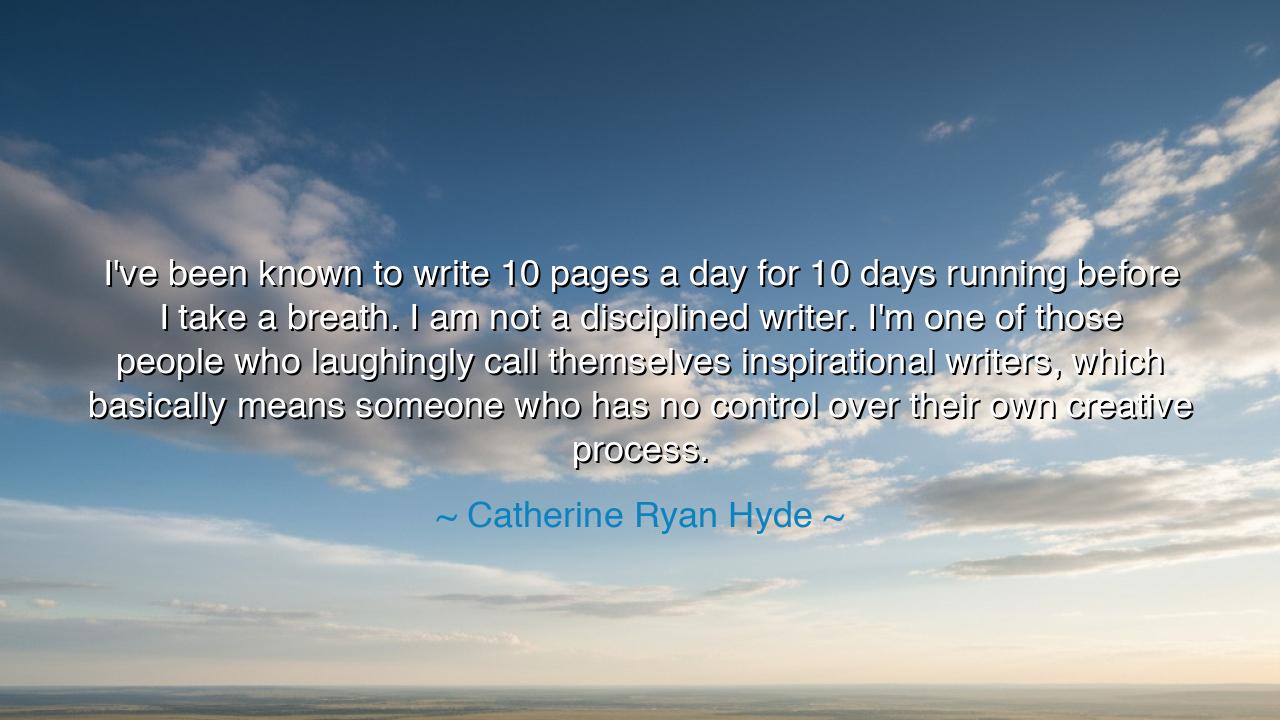
I've been known to write 10 pages a day for 10 days running
I've been known to write 10 pages a day for 10 days running before I take a breath. I am not a disciplined writer. I'm one of those people who laughingly call themselves inspirational writers, which basically means someone who has no control over their own creative process.






In the humble yet illuminating words of Catherine Ryan Hyde, we hear the confession of an artist who knows both the beauty and the burden of creation: “I've been known to write 10 pages a day for 10 days running before I take a breath. I am not a disciplined writer. I'm one of those people who laughingly call themselves inspirational writers, which basically means someone who has no control over their own creative process.” Her words are a paradox — one that every true creator will recognize. She speaks not as a master commanding her craft, but as a vessel overtaken by it, swept away by the unpredictable tides of inspiration. There is in her voice both surrender and reverence, a recognition that creativity is not always a matter of discipline, but of devotion to the divine chaos that births art itself.
In the world of the ancients, the poet was not called an author but a channel of the Muse. The Greeks believed that inspiration came from the gods — that the mind of the artist was a window, not a well. To write “10 pages a day for 10 days running” was not the achievement of the mortal, but the visitation of the immortal. When Homer sang the verses of The Iliad and The Odyssey, he did not claim ownership; he invoked the Muse of epic song, saying, “Sing, O goddess.” In the same spirit, Catherine Ryan Hyde does not boast of control, but admits its absence. To call oneself an “inspirational writer” is, in truth, an act of humility — an acknowledgment that creation is not a science, but a storm.
Her confession reveals a great truth about the creative process: that it often moves between extremes — from silence to torrent, from drought to flood. There are writers who shape their art with the precision of a sculptor’s chisel, and there are others who are swept into ecstasy, their words pouring out faster than their hands can move. Catherine belongs to the latter. Her creative fire burns not steadily but in waves, consuming her wholly until the fuel is spent. And in this, she echoes the rhythm of nature itself — the seasons that alternate between abundance and stillness, the ocean that retreats only to return.
Consider the life of Mozart, who composed entire symphonies in fits of feverish inspiration, writing by candlelight until dawn. His contemporaries called him reckless, unstructured — yet his music flowed from some deeper, uncontrollable spring. He could not force his genius to appear, only make himself ready to receive it when it did. Catherine’s words remind us that control is not always mastery, and that the wildness of inspiration, though unpredictable, is often the purest form of truth. For art, when born of impulse rather than calculation, carries the raw heartbeat of the human soul.
Yet she does not glorify disorder for its own sake. When she laughs and calls herself “one of those inspirational writers,” there is self-awareness — a recognition of both the gift and the frustration it brings. For to be ruled by inspiration is to live at its mercy. There are days of divine abundance and days of barren silence. The disciplined writer may always produce, but the inspirational writer must wait for the wind to return. This is both agony and grace: agony, because one cannot summon the muse by will; grace, because when she arrives, she transforms the ordinary into eternity.
The origin of this wisdom lies not only in the mind of the artist, but in the heart of all who create — be it the builder, the teacher, or the dreamer. For creation, in every form, alternates between effort and surrender. Even the farmers of old understood this rhythm: they plowed with discipline, but waited upon the rain. The lesson is eternal — discipline prepares the soil, but inspiration brings the harvest. Catherine’s honesty teaches us that though we cannot control the creative storm, we can remain faithful to its coming.
And so, dear listener, take this truth to heart: do not curse the silence, nor cling too tightly to the flood. When inspiration comes, give yourself to it wholly — write your “ten pages for ten days,” sing your song, build your vision. When it fades, rest without despair, for the stillness too has purpose. Creativity, like life, is not a line but a cycle, not a conquest but a communion.
For the inspirational artist is not the one who commands the muse, but the one who honors her — who listens, who trusts, who lets the divine fire pass through their trembling hands into the world. That is the lesson Catherine Ryan Hyde leaves us: to accept both the madness and the magic of creation, and to remember that in surrendering control, we sometimes find our truest power.






AAdministratorAdministrator
Welcome, honored guests. Please leave a comment, we will respond soon